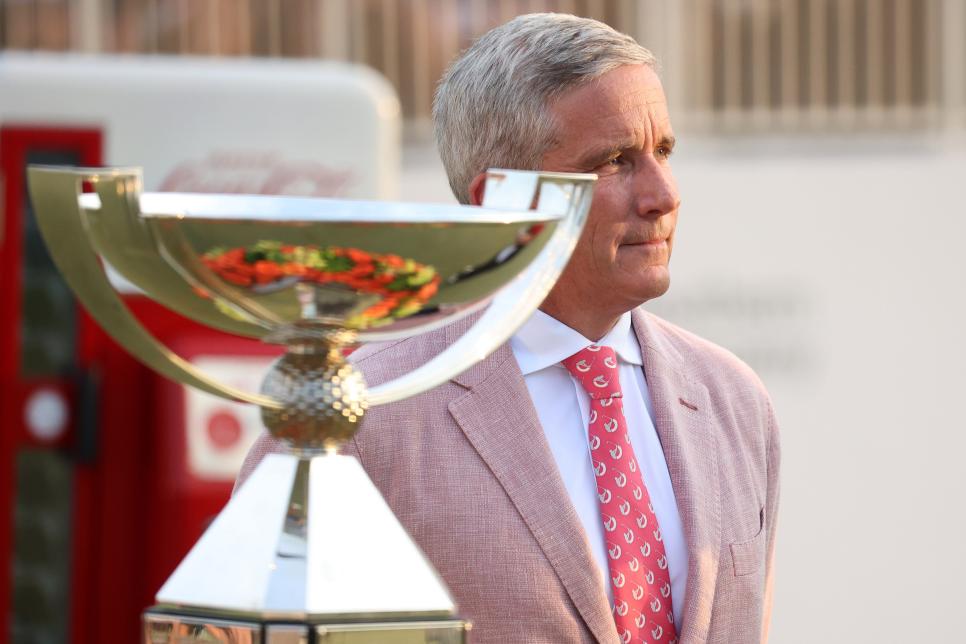His circuit is still standing and perhaps that is a triumph in itself, considering golf’s civil war put the PGA Tour on the road to economic ruin. Yet as Jay Monahan nears the precipice of securing long-term financial backing for the tour, last week crystalised that the tour finds itself in a no-win situation.
Yasir Al-Rumayyan – governor of Saudi Arabia’s Public Investment Fund, de facto head of LIV Golf and potential chairman of the newly created PGA Tour Enterprises – has been accused of carrying out instructions from Saudi Arabia Crown Prince Mohammed bin Salman with “malicious intent” in a lawsuit filed in Canada. The lawsuit alleges that a former Saudi intelligence officer’s children have been unlawfully detained by the Saudi government. It is a mere allegation, but it’s also not the first of its kind, and it’s worth noting that the accuser is Dr Saad Aljabri, who has been praised by American, English and Canadian intelligence agencies for his work in helping combat violent threats against citizens.
In a vacuum this is pretty straightforward: doing business with an alleged kidnapper seems, ahem, ill-advised. Unfortunately life is not lived in a bubble and nothing about the past two years in golf has been straightforward.
How do you assess Keith Pelley’s legacy with the DP World Tour? It’s complicated – and unfinished
Here is the conundrum for Monahan, because Al-Rumayyan is merely an avatar of Saudi power and the weight behind it. Monahan is about to partner directly with a regime involved with… well, all the entanglements and issues that can be found in a three-second Google search of that regime. There’s a case that “partner” is too neat a description, because with PIF possibly investing billions in the tour, you better believe they are going to have a significant voice in how the tour is run and where it’s going.
But – and this is a capital-B “but” – the PGA Tour can’t walk away from the framework agreement, either.
There is a harsh truth of what’s facing the tour should golf’s cold war reignite. Despite all of its shortcomings and failures, LIV Golf has blank cheques and an endless runway to take flight and has no qualms about taking the tour down if that’s what it takes to fly. That message was heard loud and clear when LIV broke the detente by signing Jon Rahm last month (although, in fairness, it could be argued the tour fired first by courting private equity). And PIF and the Saudi kingdom… they do not lose. To think LIV’s backers would back off should the tour side solely with private equity would be a comical miscalculation, and one that could be fatal.

Worse, the June 6 deal normalised doing business with the enemy. How can the tour legitimately tell its constituents not to take the very same money they are more than willing to take? The agreement, to say nothing of the secrecy surrounding it, turned off some of the tour’s most loyal and reliable advocates. Monahan has already said the tour’s business model is unsustainable and that was before a number of sponsors began departing. Whatever moral superiority assumed is likewise kaput.
Yet last week’s story puts ethics front-and-centre once again. That was the implicit understanding of June 6, that the tour was now in bed with someone with so much baggage. However, most of the moral outage was drowned out during the ensuing months by the noise of the initial shock, and golf fans had no appetite to relitigate a topic they spent the better part of 18 months discussing – to say nothing of the nuanced arguments of operating in a global economy, whataboutism and all the other nonsense that have plagued the sport. That’s why sportswashing works: it wears you down until you’re numb.
Desensitised as we’ve become, gut punches still hurt. That’s what this is, a gut punch, and it was thrown by more than one. Golf is here because of the PGA Tour leadership’s hubris. In hindsight it’s easy to wonder if all of this could have been avoided had Monahan listened to PIF’s overtures in the years leading up to LIV’s launch. That’s an elementary distillation to a very complex situation, and taking PIF’s money then would have been just as potentially messy as it is now. It’s also why Monahan receives more than $US18 million per year, to make those hard decisions, and this one would have saved so much time and resources and pain and hurt. Instead he dismissed it, banked on legacy and lost.
We’re here because of greed. Not just Rahm or Phil Mickelson, Dustin Johnson, Brooks Koepka, Bryson DeChambeau and others who made LIV Golf viable from the outset. Tour players deserve blame, particularly those who saw the schism as a chance to leverage the tour to pad their own bank accounts. Not all parties are guilty, and many put themselves and their careers on the line to fight for a greater good. But some of golf’s most important figures cared about themselves more than where they were taking the sport they supposedly love.
We’re here because of exhaustion. There is palpable fatigue from those inside the game and out regarding professional golf’s hostilities, and the sport has already reached the point where many just want peace, no matter how it’s achieved. But what is peace if there is no accounting for what is lost to achieve it?
In short order Jay Monahan will announce an agreement with an alleged kidnapper. Or he won’t and the battle for professional golf continues. Pick your poison.

